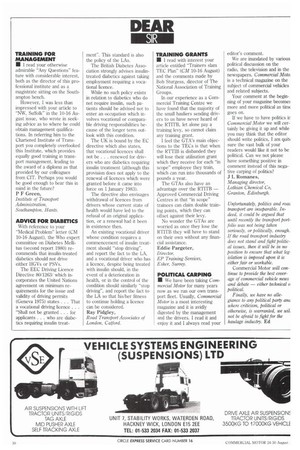DEAR
Page 32

If you've noticed an error in this article please click here to report it so we can fix it.
SIR
• I read your otherwise admirable "Any Questions" feature with considerable interest, both as the director of this professional institute and as a magistrate sitting on the Southampton bench.
However, I was less than impressed with your article to "NW, Suffolk" in the 10-16 August issue, who wrote in seeking advice as to where he could obtain management qualifications. In referring him to the Chartered Institute of Transport you completely overlooked this Institute, which provides equally good training in transport management, leading to the award of a diploma as that provided by our colleagues from CIT. Perhaps you would be good enough to bear this in mind in the future?
P F Green, Institute of Transport Administration, Southampton, Hants.
ADVICE FOR DIABETICS With reference to your "Medical Problem" letter (CM 10-16 August), the Who expert committee on Diabetes Mellitus (second report 1980) recommends that insulin-treated diabetics should not drive either HGVs or PSVs.
The EEC Driving Licence Directive 80/1263/ which incorporates the United Nations agreement on minimum requirements for the issue and validity of driving permits (Geneva 1975) states . . That a vocational driving licence . . . "Shall not be granted . . for applicants . . who are diabetics requiring insulin treat ment". This standard is also the policy of the LAs.
The British Diabetes Association strongly advises insulintreated diabetics against taking employment requiring a vocational licence.
While no such policy exists in relation to diabetics who do not require insulin, such patients should be advised not to enter an occupation which involves vocational or comparable driving responsibilities because of the longer term outlook with this condition.
The UK is bound by the EC directive which also states, that vocational licences shall not be. . . renewed for drivers who are diabetics requiring insulin treatment (although this provision does not apply to the renewal of licences which were granted before it came into force on 1 January 1983).
The directive also envisages withdrawal of licences from drivers whose current state of health would have led to the refusal of an original application, or a renewal had it been in existence then.
An existing vocational driver whose condition requires a commencement of insulin treatment should "stop driving", and report the fact to the LA, and a vocational driver who has a licence, despite being treated with insulin should, in the event of a deterioration in health, or in the control of the condition should similarly "stop driving", and report the fact to the LA so that his/her fitness to continue holding a licence can be considered.
Ray Pidgley, Road Transport Associates of London, Catford. TRAINING GRANTS • I read with interest your article entitled "Trainers slam TEC Plan" (CM 10-16 August) and the comments made by Bob Sturgess, director of The National Association of Training Groups.
In our experience as a Commercial Training Centre we have found that the majority of the small hauliers sending drivers to us have never heard of the RTITB, let alone pay a training levy, so cannot claim any training grant.
feel the GTA's main objections to the TECs is that when the RTTIB is disbanded they will lose their utilisation grant which they receive for each "in scope" employee they train, which can run into thousands of pounds a year.
The GTAs also have an advantage over the RTITB — Approved Commercial Driving Centres in that "in scope" trainees can claim double training points, which they can offset against their levy.
No wonder the GTAs are worried as once they lose the RTITB they will have to stand on their own without any financial assistance.
Eddie Pargeter, Director, EP Training Services, Esher, Surrey.
POLITICAL CARPING • We have been taking Commercial Motor for many years now as we run our own transport fleet. Usually, Commercial Motor is a most interesting magazine and it is avidly digested by the management and the drivers. I read it and enjoy it and I always read your
editor's comment.
We are inundated by various political discussion on the radio, the television and in the newspapers. Commercial Moto; is a technical magazine on the subject of commercial vehicles and related subjects.
Your comment at the beginning of your magazine become more and more political as time goes on.
If we have to have politics ir Commercial Motor we will certainly be giving it up and while you may think that the editor should write politics, I am quite sure the vast bulk of your readers would like it not to be political. Can we not please have something positive in comment instead of this negative carping of politics?
J L Romanes, Managing director, Lothian Chemical Co, Granton, Edinburgh.
Unfortunately, politics and roac transport are inseparable. Indeed, it could be argued that until recently the transport Portfolio was not being taken seriously, or politically, enough. If the road transport industry does not stand and fight political issues, then it will be in no position to ensure that what legislation is imposed upon it is either fair or workable.
Commercial Motor will continue to provide the best coverage of commercial vehicle news and debate — either technical o political.
Finally, we have no allegiance to any political party anc where criticism, political or otherwise, is warranted, we toil not be afraid to fight for the haulage indushy. Ed




































































































